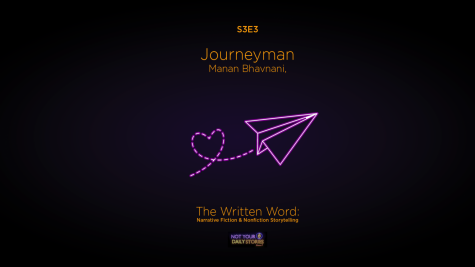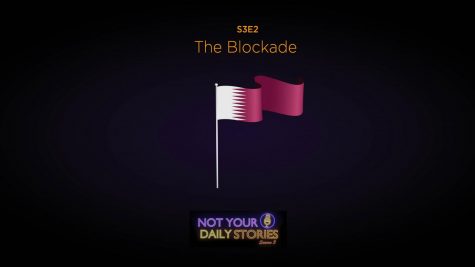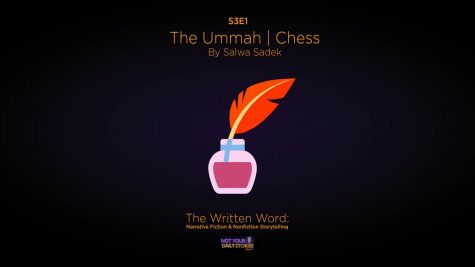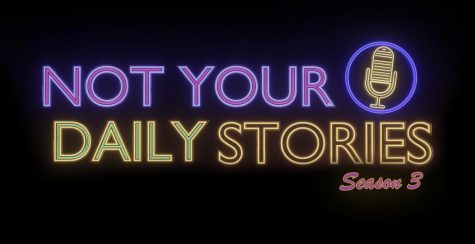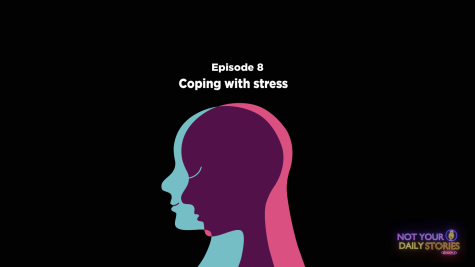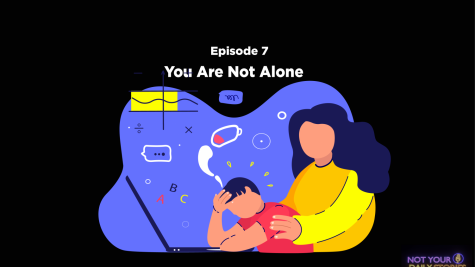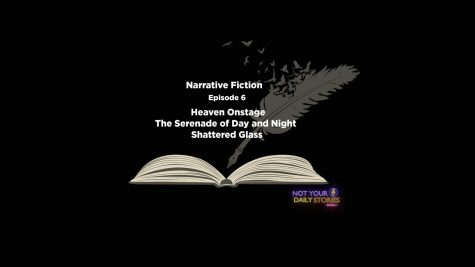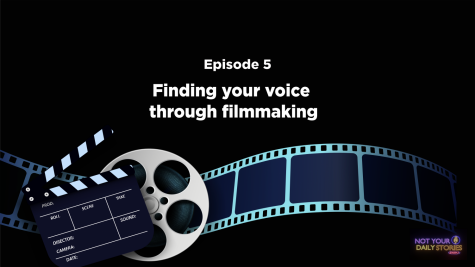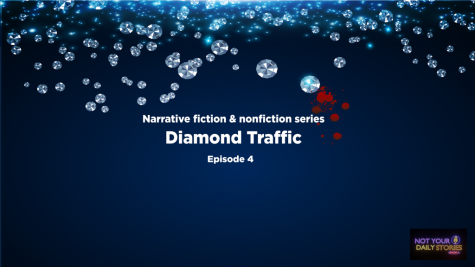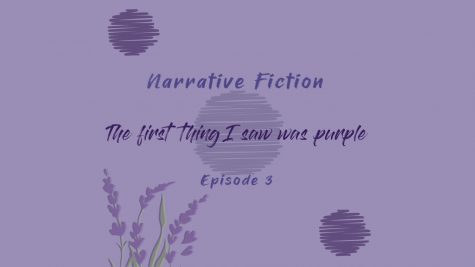Not Your Daily Stories Season 2 Ep.2
What does it mean to be a journalist and filmmaker? To cover stories that go beyond the headline and connect us to the people on the ground, and their individual stories and lived experiences? To go into (or back to) conflict regions and war zones? The answer may not be as obvious as you think. In this episode, Julia Leeb, a journalist, photographer, and filmmaker who specializes in virtual reality content production, and Mariam Al-Dhubhani, a Yemeni-Russian award-winning journalist, filmmaker, and curator, share their experiences. Leeb works as a war photojournalist and filmmaker and is the author of “North Korea: Anonymous Country” and other books. Her long-term projects have been published internationally and document political upheaval in the Democratic Republic of the Congo, Egypt, Syria, Libya, Afghanistan, South Sudan, and Iran. Al-Dhubhani is a Northwestern alumna with a BS in Journalism and Strategic Communication and an MA in Museum and Gallery Practice from University College London. She first pursued her passion for media during the 2011 Arab uprisings and utilizes virtual reality in highlighting stories from Yemen.
Music:
Song of Sadhana by Jesse Gallagher
Knowpe by Noir Et Blanc Vie
Slowly Until We Get There by Joey Pecoraro
Fioj by Text Me Records
Heuristics For The Brain by pATCHES
Orbit by Corbyn Kites
Dreamer by DivKid
On Foot by Underbelly & Ty Mayer
No. 4 Piano Journey by Esther Abrami
Transcript:
THEME MUSIC
ROJA: Welcome to Not Your Daily Stories. I’m Roja Pande
PROF. SAM: And I’m Sam Meekings. And we’re your co-hosts.
ROJA: Each episode, we talk to media professionals about their work, discuss wide-ranging topics with our community, or take a deep dive into narratives shaping student life here at Northwestern Qatar (and beyond)!
ROJA: Coming up
JULIA: Why is this history repeating again and again and again? Why don’t we learn from history? Why do people who live since decades or hundreds of years in peace suddenly start hating each other and start destroying the enemy but also destroying themselves?
MARIAM: We uploaded our first film, under bullets, literally, I will never forget that experience. It was the first time that I kind of felt this fire within me that this is what I want to do, this is what I need to do.
JULIA: People don’t want to have witnesses. And a journalist obviously is documenting the situation, so you’re always a target. And yeah, I became collateral damage.
ROJA: What does it mean to be a journalist and filmmaker, to go into (or back to) conflict regions and war zones, to cover stories that go beyond the headline and connect us to the people on the ground and their individual stories and lived experiences?
SAM: Our first guest is Julia Leeb, a war photojournalist and filmmaker, and the author of North Korea: Anonymous Country. Julia has done extensive long-term work documenting political upheaval in the Democratic Republic of the Congo, Egypt, Syria, Libya, Afghanistan, South Sudan and Iran.
JULIA: I was always interested in the planet we live in and we always see the same people, we always only see the people in the light, who are online worth international attention but there are so many people who are offline and who live in the darkness but only because we don’t see them. They still exist. And I was interested to cover the flat, blind spots of our world and that’s the reason why I go there when really nobody else is there and I want to understand how the humans are reacting. It’s not about the Arabs, Africans. It’s about why is this history repeating again and again and again? And I was interested in the first steps. How was society collapsing? And that’s the reason why I always go to the places and look for answers why we humans do this to ourselves.
SAM: Julia has been to Libya four times, during and before the fall of Muammar Gaddafi in 2011, North Korea twice, once in 2013, when North Korea entered a state of war with South Korea, and Egypt twice, during the revolution in 2011.
JULIA: I’m interested in long term changes. And a lot of like, male colleagues of mine, they go there and they cover the combat and then they go back and they go to the next one. And maybe that’s something very feminine but I like to see what is this revolution? Or what is this war into society? What are the long-term consequences? How are the power groups changing? Who is really, involved in daily life? And who takes care of the schools? Who takes care of the hospitals? Who is responsible that life goes on? And it’s a reason why I’m always going back and I have been in Libya a long time before the war. And then I went there during the unrest and I experienced the transformation to a revolution and then I was there during the days where the revolution really became a bloody war. And for me, I want to have the whole picture. And it’s the reason why I have to go forward and back and this is like a marriage. Maybe it’s not a good marriage, but you can’t get out anymore.
SAM: While you were in Libya, the car you were traveling in was attacked with a missile. In Egypt, you were attacked by a mob. How do you cope with that risk and danger?
JULIA: I think this is something universal. People don’t want to have witnesses. And yeah, I became collateral damage. And I can cope with it because I have the camera in between and this gives me mental distance, I guess. I don’t know, I didn’t go to a psychoanalyst, but maybe I should. But what really helps me is to tell the stories of the people and this is like a contract because these people, their time is really limited. They don’t know if they survive or not, and they share their really precious time with me. And I promise them to get this information out and to let the world know what’s going on. And when I’m back, and I can tell their stories, and then there are a lot of donations and people, they start donating for school and this moment, I can feel that the evil is not winning. I mean, the good may not win immediately, but it wins definitely.
ROJA: And, you know, journalists who go to conflict zones and cover heavy stories and dangerous events have always faced this certain level of danger. And with the Syrian war, ISIS, Al Qaeda, and even with the killing of Khashoggi orchestrated, allegedly by the Saudi Crown Prince, there’s a lot of violence and willingness to kill journalists from different sides and also, as democratically elected presidents like Donald Trump and Jair Bolsonaro, fuel this hatred of media and journalists, how do you think the stakes have changed for journalists now?
JULIA: Fate changed dramatically and we can see it in Europe with Turkey, nobody could intervene with them, just watching how journalists get chaired. And what information will you get out of Turkey in the future? It’s not journalism anymore, it’s PR, but it’s dangerous because also I mean, the leader should look for the long-term consequences. Of course, everybody wants to have good news but if you don’t, like, leave a society grow and be responsible and yeah, hand it the truth, you will have like an unfree society and we live in an age where innovation is the new oil. And you cannot test an innovative society if your own population is terrified. Creativity comes out from sovereign free thinkers and you have to educate your own people to be free thinkers.
ROJA: Your work documents, injustice, oppression, and stories of war and conflict but like you said, an important focus of your work has also been, you know, documenting stories about the lived experiences of individuals, of people on the ground. How do you link complex events like the conflict in Congo, or South Sudan to individual narratives? And how do you get people to open up with you and share their stories?
JULIA: Yeah, this is maybe a very philosophical question because I mean, what is the world if the world is not detached from us? The world is inhabited by billions of people who have ideas and desires and dreams. And it’s inhabited by this individual, it’s right now at this place. So, the road is all individuals and sometimes we only see the politicians for example, in North Korea that’s the reason why I wanted to go there. They don’t know anything about us. These 25 million people, they live there and we don’t know anything about them either. The only thing that we know is that there’s Kim Jong now, Kim Jong-un and the military parades, but there are also people and this was, for me, very, like yeah, very interesting and fascinating. How would these people think? What do they dream? How is their daily life? And it’s really difficult because they are very, very full of prejudice and they don’t want to open themselves and it’s a mysterium that stays but this is of course my goal to show basic life because this is, the real world is basic life. It’s not politicians, it’s the inhabitants of this planet.
SAM: Another focus of your work in North Korea, as you were just speaking about, but also in Uganda, the DRC, Transnistria, Colonia Dignidad in Chile, has been this idea of isolation, which is something you explored in your films, Brave New Realities and Blended isolations. Can you tell us a little bit more about that?
JULIA: I’m really interested in the blind spots of our planet because I want to know the world I’m living in right now. And it’s incredible that you know about so many, I don’t know, different countries, but sometimes you don’t even know your own neighbors. And I wanted to go to these places and I was very lucky to have had access and then I discovered that there is this 360 method, virtual reality, 360 filmmaking, I found the perfect media to share my experience. So, I was able to beam people from different countries who will never have the possibility to go to the warzone and Congo, for example, or to go right into the refugee camp in Uganda. And I could give them the possibility to beam themselves there and see it with their own eyes and yeah, maybe discover things that I didn’t even see yet. And this is the wonderful innovation about this media because every media is framed. Like now, we look into computers, we look into television, we look at oil painting, everything is framed but 360 is the real revolution because it’s the only media that is frameless.
ROJA: For Mariam al-Dhubhani, a Yemeni-Russian award-winning journalist, filmmaker and curator, choosing a medium that best serves a story is an important consideration. And in directing her 2019 documentary, Samsarat al-Nuhas, Mariam decided to use Virtual Reality to document the disappearing jewelry making business in Old Sana’a city in Yemen.
MARIAM: As a filmmaker, as a storyteller, I choose the medium that serves the story best. And to tell a story from a place such as Old Sana’a city in Yemen, it’s a historical place that is amazingly beautiful, if you get the chance to see the video, or any honestly any images online, it’s breathtaking. And it’s quite devastating what’s happening not only due to the war but negligence and also lack of prioritizing these trades because now food is a priority. So for me to kind of bring people into Yemen inside that they cannot come not only foreigners, but also Yemenis themselves who had to flee in 2015 at the start of the civil, or the complex war that we’re having, is to document what happened to it by the rebels, by the war, by the missiles, but also, how people are leaving those trades that are the soul of the place in so many ways. So, you’re there in that place in an immersed reality of beauty, at the same time devastation. And I couldn’t find any other medium that transcends people into Old Sana’a city as the virtual reality. So that was the main thing: to serve the story and to tell it best was to use 360. For me, storytelling is, I’m best at it when it’s audio-visual, I enjoyed it so much. That’s how I learned also. And that’s how I learned English. It’s my third language and I learned it by myself. Because I loved listening to English songs, I loved watching films, and before Google had the lyrics ready, I used to try to write them. And you know, slowly, slowly you learn and you improve. Nobody, nobody’s born with knowledge. So just try everything. Don’t, don’t let failure scare you, although it’s uncomfortable, but that’s how you know what you’re good at, what you need to learn.
ROJA: Mariam first pursued her passion for media during the 2011 Arab uprisings and co-founded her first media production then. Her films have since been screened globally in festivals such as Carthage, Interfilm, and Oaxaca.
MARIAM: I was born and raised in Yemen. And being a Middle Eastern child, of course, my dad would want me to have a career that he thinks is going to provide for me so it’s either becoming a doctor, engineer. Everything else is a waste of my time and my life basically. So, I had to study something in the medical field that I then couldn’t continue due to the war.
MARIAM: But I had this passion with me on the side and a group of my friends shared the same sentiments. And we just, by learning from doing, you know, we didn’t have any education, we just picked it up. And we decided to form this group in 2011. It was a competition at the time about what does peace mean to us. And it was us trying to speak to people that we know that we don’t know in the street, what this peace means to them. Old, young, all different sorts of Yemenis you know that we don’t see in the news, just saying what peace means to them. And you know, being naive at the time peace is such a general term, it’s a huge blanket, and to different people, it’s a different thing. Peace could be just simply falling asleep without being scared that your house would be demolished or peace could be, I don’t know, having your favorite toy and you play with it without anyone taking it away from you. It’s, it’s so many things but for us, at the time, we were excited and we were like this is our voice. We’ll be sharing about something that we lack, especially that the chaos started back in 2011 and we thought it’s a time of change, but it wasn’t the change that we wanted. I wrote a song about it. It was like my first song being recorded and added as a track within the film. And we uploaded our first film, under bullets, literally, I will never forget that experience. It was the first time that I kind of felt this fire within me that this is what I want to do, this is what I need to do. But until I joined NU-Q, until I fled and found a possibility to study in a proper university, I wasn’t able to fully, you know, establish myself as after the war, so there are always blessings in disguise, as I see it. How I got back to filmmaking after coming to Doha was through having a very personal first documentary that I directed in 2018. It spoke about my journey here, about losing my home, losing my, my, my child– losing so many things. And that film helped me heal and go through what I carried on my back and I just dismissed it for the sake of, you know, let’s just keep going because I’m here, I’m lucky enough to be here. I have electricity, I have the possibility to continue my education, many people don’t have that. And I’ve been carrying this guilt of trying to earn this privilege. And I was never good enough in my mind until I allowed myself to properly go through this mountain that I’ve been carrying and share it with the world.
ROJA: In 2019, Mariam made a documentary that chronicles the life of a Yemeni soldier; it’s titled, “In the Middle.” Here’s the synopsis: In 2015, when Houthis attacked the South of Yemen to expand their dominance, many Adenis left their education and work to defend their city. Later, with the collapse of the economy, many Adani young graduates were not able to find jobs in their fields or anywhere else. Becoming part of the armed forces was the only option to survive. Ali is one of many young men who just like their city, were promised many things but ended up with nothing. Stuck in the daily routine at checkpoints, he needs to hustle to provide for himself and his family. He does not want to be a soldier anymore, but what other options does he have.
MARIAM: “In the Middle” took a long, long journey, and I still can’t believe how that team and I managed to bring it to screen because of the difficulties of going back home and filming but also filming someone who was a soldier at a place where it’s not safe, we’re not protected. I had so many issues having the permission to go because I got a grant from Studio 20Q, which is a film club at NU-Q and later on, I got another grant from Doha Film Institute, which actually has been a huge support from the start. And going there, I thought I’d be able to shoot a film in two parts of the country but in the north, I wasn’t able to lift the camera, I would have been shot, the character didn’t want to speak to me because his life would be in danger, and also my family is there. So there were so many compromises that ended up having only one character from the south that was way safer to film there. And finding Ali, this amazing, charismatic, Yemeni young man who represents many youths like him, who graduated from universities who have dreamt of building a country but that country is not available to be, you know, developed. Instead, he is stuck in this pointless checkpoint, trying to get by. And this is the narrative that is not seen in the traditional mainstream media. You don’t see young men from the Middle East who are eloquent, who speak about love, who speak about hope. Instead, it’s always this savage, cold-hearted, you know, or dying from starvation. And this dark box has been bothering me as a Yemeni so many times because every time somebody sees me they’re like, “you don’t look Yemeni.” Then what does a Yemeni look like to you? And I understand that because we are not seen as much, we’re not known. Nobody knows anything but the darkness and the suffering so that’s how we are formed in people’s minds and therewith comes the power of us taking the narrative and in control over what is shown. And I am forever grateful for Ali for trusting me and opening up his home, letting me film with his mom. And again, I one of the best comments and feedback that I got is that it’s a rare scene to show this gentle masculinity especially from the Middle East and I was so happy to hear that because what you see is not how my dad is, not how my husband is, not how my brother is, what you see is the fragmentation of Hollywood, what the Middle East looks to them? Or what’s stuck within the international news of the famine and cholera.
MARIAM: In 2019, when, when speaking to Ali or doing any documentaries when I talk to the characters, to the people who allow me and trust me enough to tell their stories, I tell them, “I understand. I’ve been in your shoes. I know how difficult it is to have a camera on you and to open up your soul. But also, this is our stories. I am from there; this is my home.” And these people are my people. And together we are able to tell their story, these stories in a, in a more, I don’t know intimate and real way rather than someone else parachuting and telling these stories for us, knowing us for only a short period of time and having that stigma or whatever in their minds, although they might mean well, but they will never tell our stories as what we will. And I think that is what helps me the most.
ROJA: When we talk about frontline war reporting or documenting stories about conflict, we often focus on the headlines, the actions of governments, of different forces at play. But, as Julia says, who makes sure that life goes on? How do we connect hugely complex events to the lived experiences of the people on the ground?
SAM: What’s interesting about the stories we’ve heard from both our guests today is that they make use of the latest technological tools and equipment to create new innovative stories, but they do so in order to come back to the real essentials of storytelling: to show us how other people live and to share their lives and struggles with others.
ROJA: When I first came to NU-Q, Mariam was a graduating senior and I remember looking at her work and feeling completely amazed and inspired and astounded. When I worked with Julia this past summer, I saw a whole different side of journalism and filmmaking. In this episode with Julia and Mariam, we talked about emerging and innovative media like Virtual Reality and its role in storytelling — in conveying raw beauty and tragedy; And we heard from two women who document stories — so personally dangerous and professionally taxing — about what war does to people, cities, livelihoods.
SAM: Thank you for listening, and do get in touch with us via Instagram or Twitter @yourtdq to let us know what you thought of this episode or to let us know what you’d like to see in future episodes of Not Your Daily Stories.
ROJA: This episode was produced by Roja Pande, co-hosted by Roja Pande and Sam Meekings, with editing by Syed Ali Ahsan and graphics and artwork by Ahmed Jassim.



